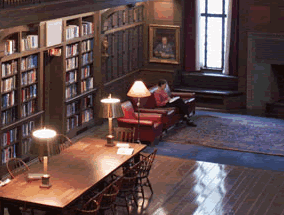| Sterling Memorial |
| Archives |
| Music |
| Divinity |
| Forestry |
| Kline Sciences |
| Medical Historical |
| Exhibit Map |
| Vladimir Vernadsky, G. Evelyn Hutchinson,
James Lovelock and Lynn Margulis: A Conclusion
The history of the concept of the “cycle of life” in the twentieth century extends far beyond Vinogradskii. Vladimir Vernadsky and Vinogradskii shared a similar background--both came from an agricultural region in southern Russia, attended St. Petersburg University in the 1870s-1880s, and grounded their scientific world view in Russian holism. Vernadsky--who had a much more gregarious and aggressive scientific style--developed numerous and extensive research programs, founded the science of biogeochemistry and developed the modern conception of the biosphere. One of the founders of ecosystem ecology, G. Evelyn Hutchinson, took great interest in Soviet biogeochemistry. A zoologist and limnologist by training, Hutchinson adopted and developed Vernadsky’s holistic vision and methods, eventually training the first generation of ecosystem ecologists. Lynn Margulis was inspired by Hutchinson’s work and applied to her research on symbiosis and the origin of life question. This led her to a collaboration at NASA with James Lovelock. Together they formulated the scientific world view and experimental program known as Gaia or Mother Earth. |
| Case 1 |
| Case 2 |
| Case 3 |
| Case 4 |
| Case 5 |
| Case 6 |
| Case 7 |
| Case 8 |
Whitney Humanities Center
Yale University
53 Wall Street
P.O. Box 208298
New Haven, CT 06520-8298
Office: (203).432.3112
lloydackert@sbcglobal.net
Yale University School of Medicine Building
333 Cedar Street
New Haven, CT
Map, Directions
